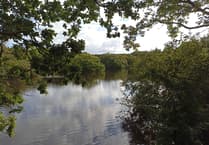IN the 1950s, the A38 stopped at Saltash, with a ferry taking vehicles and passengers across the River Tamar to Plymouth. Cornwall Council joined Plymouth City Council to ask Westminster to build a bridge to connect the two communities, but the government responded that they would not build the bridge with central funding, but would pass legislation to enable both authorities to fund, build and maintain the bridge, and operate the Torpoint Ferry.
The 1957 Act allowed both local authorities to set up the Tamar Bridge Joint Committee, with five councillors each. I have been appointed to be one of the councillors from Cornwall on this committee which governs the way the bridge and ferries are managed, with the right to collect Tolls. However changes to the toll rates need permission from The Secretary of State for Transport, as prescribed in the Act.
As a Liberal Democrat, I have been campaigning to scrap the Tamar Tolls, so I was very keen to take up this role. I have had two induction sessions, the first, a general introduction, included a tour of the bridge and offices. I learnt that the ferry is the busiest in the UK, but requires less power than a free floating ferry as a chain ferry is more efficient. Whilst the ferry needs more staff for operations, both in the control tower and on the ferries, the bridge requires a team of engineers to survey the structure to look for any corrosion and commissioning repairs. I was allowed to see work taking place under the main deck, walking along gantries about 30 metres above the river (see photo). The ferry carries two-million vehicles per year as compared to nearly 15-million for the bridge.
I also saw the bridge traffic control system in operation, which includes traffic through the Saltash Tunnel, so National Highways helps cover these costs.
The second session focussed on the finances. The costs, which can be split between running costs, mainly maintenance, fuel and staff, and capital expenditure and financing, amount to nearly £20-million per annum. With the benefit of hindsight, it is easy to see that the councillors and MPs, from both Plymouth and Cornwall, should have persuaded Westminster that the 1957 Act should have allowed tolls to be levied to repay the capital and interest, and not the ongoing running costs, maintenance and repairs.
As a Cornwall councillor, I have long argued that the tolls are an extra tax burden on the residents of SE Cornwall, so will continue to work to see them phased out. There is no likelihood of either Cornwall or Plymouth Councils finding £10-million in their revenue budgets to pay for the operational costs. I know that this is now an opportunity to work with MPs and councillors on both sides of the Tamar to work together. In the meantime, I will work within the terms of the 1957 Act to make sure that the travelling public are able to cross the Tamar efficiently and reliably.





Comments
This article has no comments yet. Be the first to leave a comment.